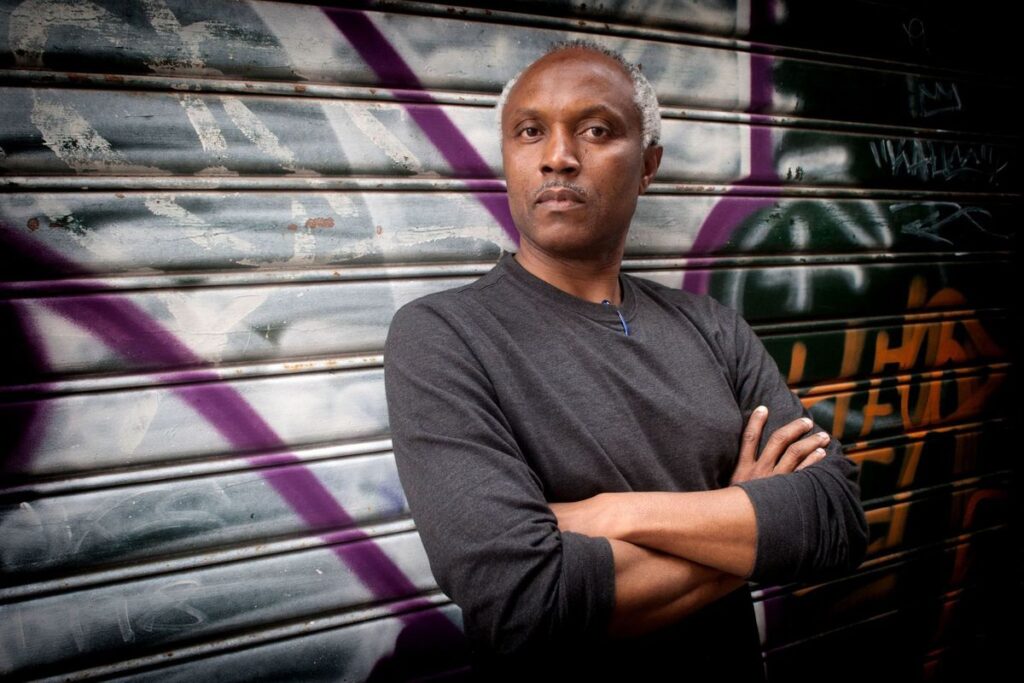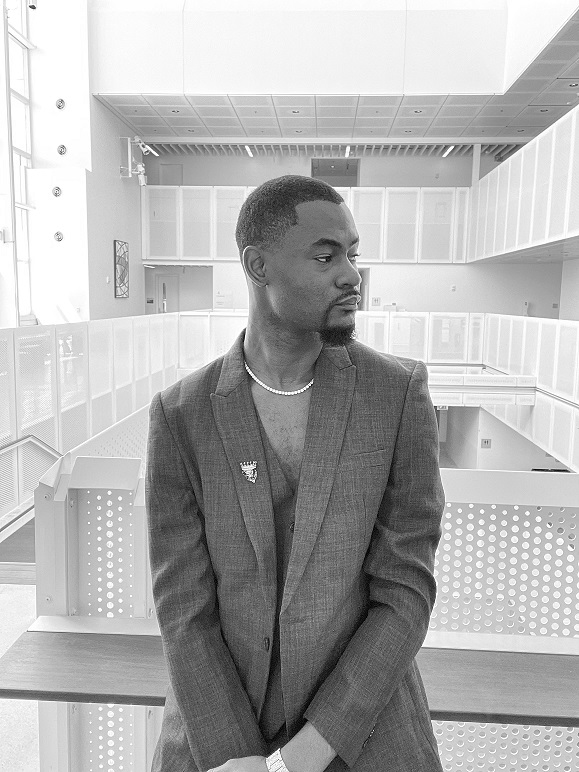On Wednesday, 21 January, the Nigerian novelist and political commentator Okey Ndibe was detained by the Department of State Security (DSS). Ndibe was at Murtala Mohammed International Airport, Lagos, when the officers stopped him from boarding his flight. It was not the first time he would be held while traveling. Since 2008, the outspoken writer’s name had been on a list of “enemies of the Nigerian state.” He was eventually released.
He tweeted: “To friends and relatives concerned about news that security agents at Lagos airport tried to stop me from traveling out to US base: I’m now at Heathrow and fine. Thanks, all. Fear is a choice; I’ve chosen NOT to fear.”
Ndibe, author of the novels Arrows of Rain (2000) and foreign gods, inc. (2014) and of the memoir Never Look an American in the Eye (2016), found national notability in the 2000s with his columns in The Guardian, 234Next, and The Sun.
In this interview with Open Country Mag, Ndibe tells us how it all began, how being a non-partisan public intellectual has made him the target of three successive federal governments.
You made your name as a social critic and political commentator with your columns for The Guardian, 234Next, and The Sun, which you wrote for 18 years. How did it begin and how did it end?
In 1999, shortly after the inauguration of President Olusegun Obasanjo, Emeka Izeze, the then MD of the Guardian, invited me to take up a weekly column in the daily paper. In 2007, the Guardian and I had a disagreement over the content of my column. We parted ways. Immediately, the (now late) Dimgba Igwe, who was deputy MD of the Sun, asked me to start writing for his paper. As he assured me that the paper would not censor my column, I eagerly accepted his invitation.
I had a good run in the paper until a new editorial management team took over. On one occasion, when I visited the paper’s headquarters in Lagos, some of the new editors complained that the tone of my column had hampered the paper’s relationship with Aso Rock as well as some state governors. I explained that I could not change the tone or direction of my writing. Instead, I would cease writing the column altogether if the editors felt that was best for the paper. They didn’t invoke that option, but one of the editors insisted I must realize they were a business—and sometimes needed the goodwill of people in politics to survive.
In mid-March of 2017, I noticed that the paper had not paid me for my column for more than two months. When I asked why, the MD explained that they had decided to stop paying all columnists. I was shocked that the paper’s management had acted unilaterally, discounting the fact I had written for the paper for ten years. The MD claimed the editor had notified me of the paper’s decision, but I had received no such notice and the paper could produce no proof it was ever sent.
I insisted that I be paid my outstanding fees, and—having written a weekly column for 18 years in three newspapers—I decided to take a long sabbatical to focus on writing more novels and other books.
How did your harassment by Nigerian security officials begin?
I had made three trips to Nigeria for various engagements in 2008. Umaru Yar’Adua was then in power. Even so, I had declared in my column that I would never dignify him with the title “President” as he had admitted to irregularities in the election that produced him.
I was preparing my fourth visit in December of that year to offer a workshop to editorial staff of 234Next when I received a call from an online journalist, who was then detained by DSS agents in Nigeria. The journalist said that my name was on a list of targeted writers. He knew this because, during interrogation sessions, DSS agents always asked how he knew me. Interestingly, the journalist and I hardly knew each other at that time. So, he was the one who alerted me to my name’s inclusion on a list of “enemies of the Nigerian state.”
Despite his warning, I insisted I would proceed to Nigeria as planned. A debate ensued between two factions of my friends and colleagues, one faction supporting my decision, the other opposed to my traveling.
Meanwhile, I had kept my wife in the dark so as not to rattle her. However, one of my friends who was against my traveling to Nigeria threatened to tell my wife about my potential arrest. At that point, I had to tell her myself. She was willing to accept whatever decision I took, but worried that our kids might be terrified if I got detained. At that point I canceled the trip.
After Yar’Adua’s death, his erstwhile VP, Goodluck Jonathan, came to the US on an official visit. Two of Jonathan’s aides, Oronto Douglas and Ken Wiwa, Jr. (both late), called to invite me to Washington, DC to meet him.
I declined the invitation on two grounds. First, I explained that as a matter of principle I refrain from meeting privately with politicians who would be subjects of my column. Two, I stated that Jonathan was part of an administration that had declared me an enemy of the state. Both Ken Wiwa and Oronto called back to tell me they had discussed the latter issue with Jonathan—and that he had given instructions to immediately expunge the list.
In January 2011, I flew into Lagos—my first trip to Nigeria since late 2008. To my shock, the DSS detained me at the airport for three hours. Eventually they confiscated my Nigerian and US passports and asked me to report the following Monday at their office in Lagos.
News of my arrest went global. At the behest of the Connecticut Congressional delegation, the US State Department asked why the Nigerian government had seized my US passport.
On Monday of that week, I went with a lawyer, Sanjo Fagbemi, to the DSS office in Ikoyi. The DSS director apologized for the harassment I suffered, blamed the government of the late Yar’Adua, and assured me that Jonathan had ordered my name removed from the security agency’s list of wanted people. He returned my passports.
A day later, an editor at the Sun newspaper phoned to tell me that the DG of the DSS had spoken to him regarding my case. According to the editor, the DG said I must write a formal petition to him before my name could be removed from the list targeted journalists and writers. I made it clear that I would write no such petition. For me, it was a matter of principle. I had not written an application to be put on a list of enemies of the Nigerian state; I would not write to be removed either. Whoever put my name on the list bore the responsibility of removing it.
Since 2011, I’ve been subjected to some manner of detention on my arrival in or departure from Nigeria. Often, I’m questioned for 20, 30 minutes, but on one occasion in Lagos, I was held overnight for more than 10 hours.
In July of 2017, I arrived in Nigeria for a six-city book tour to promote the Nigerian editions of my second novel, foreign gods, inc., and my memoir, Never Look an American in the Eye (both published by Bookcraft Africa, Ibadan). When I read in Abuja, an acquaintance who was a senior aide to then Internal Affairs Minister asked if I was still subjected to DSS harassment. When I answered in the affirmative, he said he would talk to the Minister about the matter. Another fellow said he was going to raise the issue with one of President Buhari’s spokesmen. Interestingly, the DSS agents did not stop me as I left Nigeria at the end of my book tour. Nor did they question me when I returned to Nigeria in 2018.
In 2019, I was in Nigeria for the presentation of my book, The Man Lives: A Conversation with Wole Soyinka on Life, Literature and Politics. During a visit to Abuja to give a talk at the National Open University of Nigeria, I appeared on Arise TV’s Morning Show where—among other positions—I stated what should be uncontroversial: that President Buhari was visionless. And that he—along with his predecessors in office—had failed Nigerians.
A few days after that TV interview, on my way out of Nigeria, the DSS resumed their former practice of questioning me over what I did during my visit.
The latest episode in this absurd drama of harassment was last Wednesday when I was leaving Nigeria after a month-long visit.
Why do you think you are being targeted?
There’s little secret about the original reason: my consistent criticism—in writing and speeches—of Nigeria’s mediocre, visionless, and vicious rulers. It’s amazing that any government would put writers like me on a list of enemies of the Nigerian state, but bestow national honors on those who’ve gutted the country’s promise and kept Nigeria in a dismal state.
It’s a paradox worthy of Orwell: those who advocate transparency, accountability, and good governance are enemies; those who wreck the Nigerian collectivity, the knaves, mediocrities, and fools whose greed for primitive accumulation has left Nigeria bereft of hope, are the revered, venerated patriots!
You are now considering a lawsuit. To what extent do you hope that it would end this?
For years, I discounted filing a lawsuit, hoping that somebody in government or within the security apparatus would have the sense or decency to order an end to this silly, unproductive hounding of an innocent citizen. I had hoped that the Nigerian state would awake one day to the realization that a writer who calls out corruption and ineptitude and visionlessness could not be an enemy by any sane definition.
Now I’m left no choice; I’ll retain a lawyer to assert my legal rights as a citizen to come and go from my natal country without subjection to undue harassment. It’s up to a judge to decide whether my rights are upheld, or the state may continue its violation of my and others’ fundamental human rights. I hope the judiciary inclines to the former position.
What would you say to writers who have been targeted, directly and indirectly, by Nigerian federal and state governments? What would you say to young writers who are watching and losing hope in the moral responsibility of literature in Nigeria?
I’d say to writers, stay the course. Don’t ever succumb to intimidation—for that’s exactly the point.
Those who’ve made it their grim business to destroy the lives of other Nigerians won’t countenance any writer who calls out their perfidy, their cravenness and puniness. But the writer’s antidote is to know that the swagger of the politically powerful is often an empty pose. Yes, they flaunt wealth, but the wealth is unearned and, sooner or later, vanishes. Yes, they strike imperial poses, but they are naked and hollow.
In the end, the writer must realize that the point of being harassed is to strike fear in you, to still your voice. So, recognize that fear is a choice; choose not to fear.


